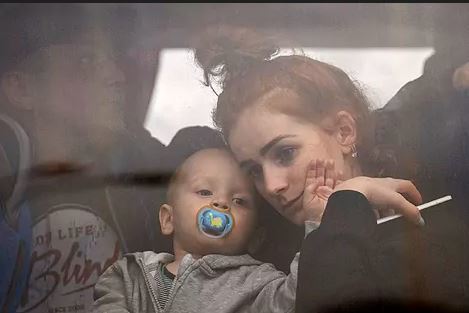Ruslana Hrytskiv asked this week on Facebook for a donation of shoes for twin boys, refugees from Ukraine in the Czech Republic, but her message only sparked comments about the contraindications of wearing used shoes.
Ruslana claimed that the mother of these children had no money to buy them clothes or shoes, but these explanations did not convince anyone. “Reactions to requests are slower. At the beginning of the conflict, people reacted quickly,” explains Hrytskiv, a Ukrainian living in the Czech Republic for more than 20 years.
Since the Russian invasion on February 24, this woman has helped “dozens, maybe hundreds” of refugees, including the mother of these twins, who had a third child during her flight to Prague. What Hrystkiv finds coincides with what numerous humanitarian organizations in Eastern Europe observe. The countries of this region host hundreds of thousands of refugees from the conflict, mainly women with children.
Like the rest of Europe, the area is hit by inflation, due in part to the Russian invasion, forcing families to cut back on spending. “The propensity to help has decreased since the start of the war,” observes Eszter Bakondi Kiss, a volunteer with the Hungarian NGO Habitat for Humanity, which coordinated a shelter program for the refugees.
“We received many proposals for accommodation at the beginning of the war,” he explains to AFP. And on the side of the Slovak NGO People In Need, donations have also fallen, falling from 650,000 euros ($661,000) in February and March to 85,000 euros ($86,000) in May, according to its spokeswoman Simona Stiskalova.
“It’s a natural effect. A topical cause generates a lot of engagement. Then interest wanes,” explains Svilena Georgiev, who runs the Bulgarian Za Dobroto Foundation. “However, 90% of the donations we receive are still destined for campaigns in support of Ukraine,” she says.
“Poverty threatens a growing part of the population” of the country, explains Prague sociologist Daniel Prokop. “And it is feared that support for Ukraine will supplant aid to local populations,” he told AFP.
Lavinia Varodi, who works for the Romanian branch of Save the Children, says that companies and individuals “have exhausted their budgets”. “Only the big organizations continue to give, since they have the means to dedicate specific funds to the Ukrainian cause,” she says. Agnès Baranyai, a volunteer at a youth hostel in Budapest where refugees are housed, regrets that support weakens with the holidays. Of summer.
“People want to go back to normal life,” he says. “The support is still necessary but the needs change,” analyzes Dominika Pszczolkowska, a migration researcher at the University of Warsaw.
Conforms to The Trust Project criteria
















